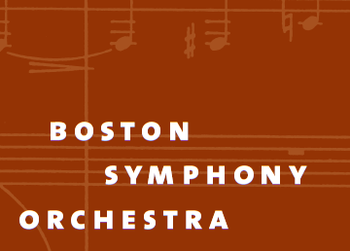 |
| The logo of the Boston Symphony Orchestra. (Photo credit: Wikipedia) |
As is the case with many of America's pre-eminent orchestras -- of which the Boston Symphony is clearly one -- the ensemble's history can be told as a series of stories about its conductors. These singular stars of the podium command significant salaries and enjoy considerable influence over an orchestra's schedule, the type of sound it presents to the public, and even whether or not it will perform on tour -- and where. Most principal conductors also take on the title of music director, which gives them the power to make these kinds of organization-changing decisions.
The Boston Symphony Orchestra (BSO) was founded in 1881, making it one of the oldest orchestras in the United States with a continuous performing history. The founder was Henry Lee Higginson, a wealthy businessman born in New York City but raised in Boston from the age of four. He was a Union Army officer during the U.S. Civil War and acquired considerable wealth following the conflict while working in his father's brokerage firm -- having first failed on his own in both the oil business and as the owner of a Georgia cotton farm. After struggling for some years to find its audience, the BSO began to flourish in the early years of the 20th century, thanks in great part to finding a permanent home in Symphony Hall, which hosted its first concert on October 15, 1900.
The orchestra was dominated in its early days by a string of German-born conductors, among them Wilhelm Gericke, Max Fiedler, and Karl Muck. Maestro Muck served two terms as BSO music director -- his final stint took place from 1912-18 -- and left with some rancor due to a rising tide of anti-German American public opinion after the country entered World War I. Two French conductors succeeded him, and the orchestra began to emphasize the French classical tradition from that point forward. The hiring of a number of musicians trained in France encouraged the furtherance of this tradition.
In 1924, the Boston Symphony signed Russian-born Serge Koussivitsky to be its principal conductor and music director, and this dynamic individual remained in those twin posts for 25 years, an almost unprecedented situation in classical orchestra circles. Under his leadership, the BSO began a series of radio broadcasts, and he also encouraged wider exposure by taking the ensemble west to the Berkshire Mountains for annual summer concerts. This program led to the founding of Tanglewood in 1940, and the venue has served as the summer home of the Boston Symphony ever since. During his tenure with the BSO, Koussevitsky commissioned orchestral works from a number of prominent composers. These pieces included Prokofiev's Symphony No. 4, Stravinsky's Symphony of Psalms, and Bartok's Concerto for Orchestra (which was actually commissioned by the maestro's personal foundation but given its premiere by the BSO). The Russian director left in 1949, to be succeeded by French/Alsatian conductor Charles Munch. He remained with the orchestra until 1962, at which point Erich Leinsdorf took over as director.
For the Boston Symphony, the latter half of the 20th century was dominated by the reign of Seiji Ozawa, who led the orchestra from 1973 until 2002. Ozawa continued the ensemble's reputation for excellence -- he toured with them numerous times all around the world -- as well as making hundreds of recordings on a variety of record labels. James Levine, the first American to lead the Boston Symphony, replaced him in 2004. Levine helped revitalize the orchestra's reputation for playing new music, leading them to no fewer than 18 world premieres in six years. He continued to fulfill that role with the BSO while also remaining in charge of New York's Metropolitan Opera until a severe illness curtailed both activities.
Beginning in 2014 the BSO's music director is Andris Nelsons. He formerly held a similar post with the City of Birmingham [U.K.] Symphony Orchestra, having begun his musical career in his native Riga, Latvia, as a trumpet player in that country's national orchestra.
Article Source: EzineArticles |

